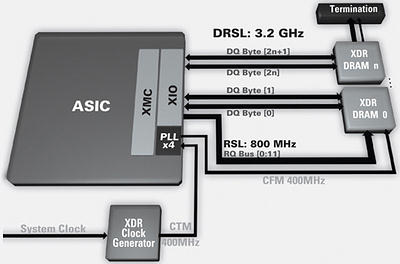 |
||
|
||
| ||
Novelties from Creative: DDTS-100 external decoder and 7.1-channel GigaWorks S750-D sound system Toshiba showcases 512Mbit XDR DRAM chips SMIC to produce Elpida´s DRAM chips using 0.10µm process Novelties from Creative: DDTS-100 external decoder and 7.1-channel GigaWorks S750-D sound system In about the late January Creative is to ship its new sound solutions: the external Creative Decoder DDTS-100 and Creative GigaWorks S750-D speakers.
 Creative Decoder DDTS-100 Creative Decoder DDTS-100 specs:
Creative Decoder DDTS-100 will be shipping both standalone and with the 7.1-channel Creative GigaWorks S750. The Creative Decoder DDTS-100 bundle will be called Creative GigaWorks S750-D.
 GigaWorks S750  GigaWorks S750-D Source: ASCII24
Toshiba showcases 512Mbit XDR DRAM chips Japanese Toshiba launched shipments of its 512Mbit XDR DRAM chips operating at 3.2GHz. This memory is designed for broadband equipment, graphics systems, and consumer electronics. Based on Rambus XDR technology, Toshiba´s memory provides throughput 8 times higher than the existing high-end memory for PC.
 Company´s TC59YM916AMG32A, TC59YM916AMG32B, TC59YM916AMG32C solutions have the following features:
Using 128-bit bus, you can get the throughput of 100GB/s, that´s 16 times more than the existing solutions can offer. XDIMM modules provide 12.8-25.6GB/s that´s 4 times higher than that of similar DDR2 SDRAM modules.  XDR topology At the moment the license for Rambus memory interface is purchased by Samsung, Elpida, Toshiba. Being the market leaders, these can advance such memory in the market. Besides, Rambus provided makers with all information required for making XDR mainstream: specs of XDR DRAM chips with programmable packet length, organization, components (including buffers, clock generators), etc.
SMIC to produce Elpida´s DRAM chips using 0.10µm process The management of Elpida, a joint venture of Hitachi and NEC, signed the agreement to outsource chips to Semiconductor Manufacturing International Corp (SMIC).
 According to the agreement the Chinese company will be producing DRAM chips using 0.10µm process. Scheduled for launch to Q4 2004, the partnership is to last for 5 years. No monthly production volumes were disclosed. This is the second agreement of these companies. Currently SMIC produces chips for Elpida using the 0.13µm process. According to Elpida, the new contract will allow 50% chip orders from SMIC and only the 50% production at own facilities. After the severance of Elpida and ProMOS, the partnership with SMIC will enable the chip manufacturer to increase production volumes and establish the more flexible shipments system. Drawing the bottom line, I should mention that Elpida plans to become the 3rd world DRAM maker with its own chip architectural development and outsourcing channgels.
Write a comment below. No registration needed!
|
Platform · Video · Multimedia · Mobile · Other || About us & Privacy policy · Twitter · Facebook Copyright © Byrds Research & Publishing, Ltd., 1997–2011. All rights reserved. |